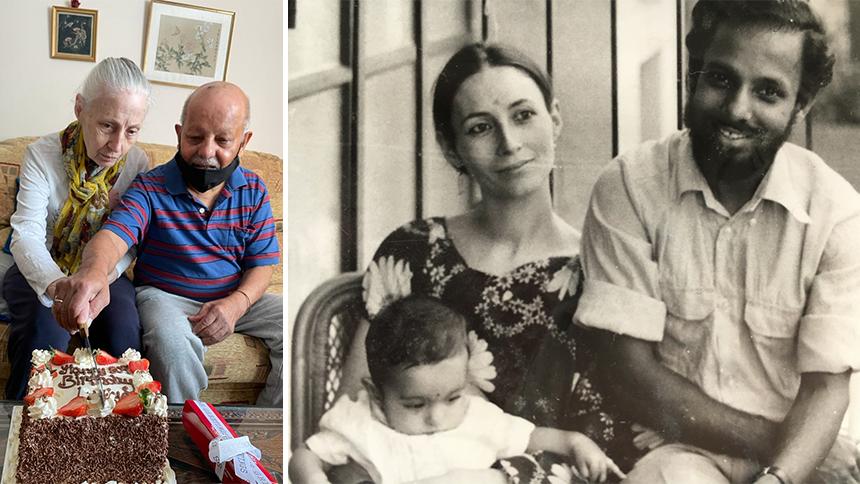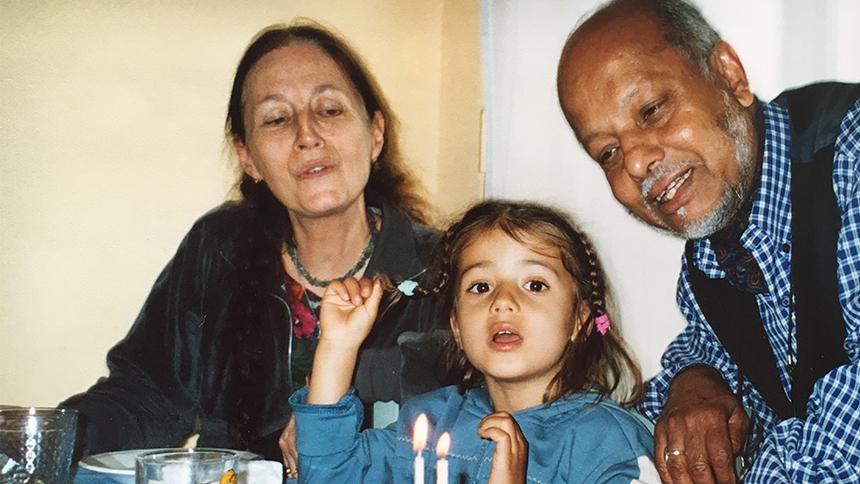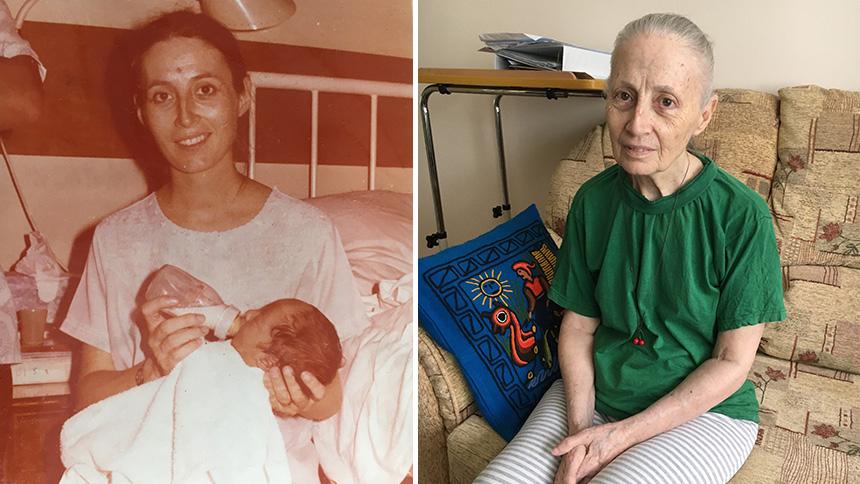Despite the challenges of mixed dementia, this couple’s constant is their mutual warmth
Pranab Das, who’s been trying to navigate the challenges of dementia care since his wife’s diagnosis, says he’ll never stop showing his love.
‘For me, every day is a new day – it’s continuous learning,’ says Pranab Das, whose wife, Lucie, has mixed dementia.
Supporting Lucie has been a ‘big education’ for Pranab. He wants her to be able to remain at home, but has faced challenges trying to find the right professional care.
Despite all of this, and his worries about the future, Pranab strives to always be there for his wife.
‘I do wonder, what is going to happen? Where is this going to lead? It’s very sad and sometimes I cry,’ he says. ‘Luckily, one thing remains constant – the warmth of her, our mutual warmth.’

Romeo and Juliet
Pranab is a biochemist who was born in India before coming to England in 1963 to further his research career. He recalls arriving in France during a cold winter, following a ‘remarkable’ two-week boat trip, before getting the renowned Golden Arrow train non-stop to London.
Pranab studied genetics and enzymes, and how plants can be used to treat disease. He was also a lecturer in many places, including Hong Kong and Amsterdam, and remains an Honorary Senior Research and Teaching Fellow at the University of Birmingham.
Lucie is French and was born in Tunisia in north Africa. The couple, both now 80, have been married for 54 years, having met in London in 1967. They have one daughter, Elsa, a GP in France.
‘Lucie was an exceptional woman’, says Pranab, who lives in Sutton Coldfield in the West Midlands.
‘My daughter says we’re like a Romeo and Juliet – we’re inseparable. When we were both in our 70s, we went to Beijing for a conference and they gave us the honeymoon suite because they thought we were newlyweds!
‘Lucie was a daydreamer but also incredibly well read in literature. She was interested in psychoanalysis and wrote a book about the dreams she had and what they meant. We were in the process of publishing it when she got sick.’
Why her?
Looking back, Pranab wonders if Lucie’s ‘dreamy’ persona meant that he didn’t notice her dementia symptoms sooner. His earliest recollection is a 2018 trip to Brazil, around which time Lucie was experiencing changes in her physical and mental health, including headaches, flu-like symptoms and what Pranab describes as ‘depressive’ behaviour.
Back in England, she was given antidepressants and later hospitalised. She was moved to a psychiatric unit but lost weight and had a heart attack. A brain scan suggested vascular dementia, before an official diagnosis of mixed dementia in July 2019.
‘I started with despair: “Why her?”’ says Pranab. ‘She was a late bloomer who had started enjoying life in her own way. She was volunteering in a hospice bookshop and was going to publish her own book, and then suddenly dementia.
‘I felt sad and scared. “How am I going to go through it?”’

Quality care
Lucie can become agitated with Pranab, swearing at him in different languages. She also has fragmented sleep and experiences confusion, for example thinking that something she has read in a book is real life.
‘Sometimes she thinks that she’s caring for me,’ says Pranab. ‘Lucie is a bit incontinent but she’ll tell me to wear my nappies – she’ll say I’ve got dementia.
‘I’m a medical scientist but you can’t explain dementia scientifically, it’s a mystifying disease.’
Pranab had a bad experience with what he describes as ‘laughable’ support from social services, before arranging care at home from agencies. He’s very critical of many of these too.
‘Some carers are so good and are well connected with my wife and I, and then their agency changes the person and the whole process goes down the drain,’ he says. ‘These relationships are so important, but the managers don’t seem to want to build them.
‘Care agencies boast about their dementia expertise, but no one is an expert.’
Pranab, who made an official complaint against one agency, feels that making money can come before providing a good service.
‘I had to pay for the care unless it’s cancelled 12 hours before, but Lucie isn’t always in the right mood for a carer to visit. I can’t predict 12 hours in advance with a person with dementia.’
Like a daughter
Pranab was referred to Alzheimer’s Society by a social worker, and has received excellent support from Kiran Daman, a Dementia Support Worker.
‘Kiran is tremendous,’ says Pranab. ‘She’s almost like a daughter to me. If I don’t hear from her, I get nervous!’
Kiran advises Pranab on how best to support both Lucie and himself.
‘Lucie used to be aggressive and was spitting at me, but Kiran told me how to handle it,’ says Pranab. ‘She said to leave the room and come back as if nothing happened. And she was right.
‘Kiran has also taught me to be patient. I’m an ill-tempered person, agitated very easily. She helped me to become tolerant and calm.’
Meanwhile the pandemic has created new challenges for Pranab who, along with Lucie, had his second COVID vaccination in April.
‘The pandemic has made everything worse,’ he says. ‘My daughter used to visit once a month from Paris, but now I have her and my granddaughter Mila on the phone trying to get Lucie to eat.’

Don’t stop
As he continues doing all he can to ensure that Lucie receives the best possible care and support, Pranab hopes his story will inspire others to keep going.
‘I never dreamt this would happen. I’m still on the journey and every day is a new experience,’ he says. ‘You face the despair, but you have to be courageous.
‘People with dementia are not completely obscured. They still have creativity, it’s just all mixed up. They can still feel your warmth, so don’t ever stop giving them love.’
What can you do to help?
Help to ensure that more carers like Pranab receive the support that they need by donating to Alzheimer's Society.


JoAnne
saysI appreciate your story Prenab for many reasons. Thank you for sharing it. I am in your situation with my brilliant and sweet husband. I am changing my pace and learning to live in the moment- there are still some great ones that shed light on compassion in both directions- I’m glad to be able to have him home as long as possible and safe.
Trish
saysI understand everything that is said.I was diagnosed almost 1 year ago at 64 years old with early onset dementia.At first I cried everyday for quite a while,couldn't believe it.I use to work on dementia wards when I was nursing years ago.never thought that I would be going through it myself.I cry a lot which isn't going to change anything.Maybe some day I will accept it and move on.I have a wonderful husband and daughter who help look after me.The fear of how I am going to be upsets me sometimes when I think about.Itd not easy.Tjinking of everyone in the same position.Good luck Trish,,
Kristian Schofield
saysThanks for sharing and God bless you both
Patricia Rosa
saysDear Pran. I ubderstand your feeling. I had to deal with my mother. Never give up. And remember all the nice experiences you went through together!!! We miss you both!!! Love and tight hugs!!!!
Christine Robson
saysDear Pranab you are being a wonderful
and caring husband as, although your wife has dementia, she is still your wife who you love dearly. My wonderful husband had Alzheimer’s and died a few years ago so I appreciate how devastating it can be at times. During my husband’s illness I learnt to cope with the different stages he went through and my biggest advice is “never argue” as they are confused enough so just listen. My thoughts are with you.
They are confused enough so just listen and surr
Margaret Douglas
saysThank you for sharing your story Pranab. I am so moved to read about you and your wife Lucie. This awful disease is so cruel. Your love for her is so beautiful to read. Warmest wishes Margaret
Geoffrey Dunn
saysMy wife was diagnosed with Alzheimer's 7 years ago at the age of 81. I too have found that what Pranab has described in the way of understanding and continuous love, is the best way forward. We are not alone in our struggle and though she is not acting in the way she was in our earlier days, the woman I love is still in there and comes out occasionally though less often these days. She has given herself to me in the past now it is my privilege to return that caring to her. Well done Pranab.
Isabella Paton
saysYour story is similar to mine my husband has Alzheimer's and it is life changing for both of us.
He gets so depressed and crud till he done and it breaks my heart but I'm unable to stop this it is awful heart breaking watching him and not being able to help him so I just have to wait until he settles down.My thought and prayers are with you both hang on in there.
Claire
saysThank you for sharing your and Lucie's story Pranab. "Romeo and Juliet ..." made me smile, but also made reading about your situation all the more poignant . I'm sorry you found the right professional care was not there for Lucie. I agree that any agency that claims to be an 'expert' in dementia, likely isn't - and we should all be constantly learning from each other. I am not commenting to talk about my agency, but there are providers out there who understand that every client is different.
It's a difficult situation in that we have to recruit the right staff, and to retain those brilliant Carers, we have to give them a level of financial security which means if a visit is cancelled at short notice, we pay the staff member and charge for the visit.
We have clients with dementia who are ‘having a bad day’ – but if the familiar Carer knows their client and is skilled in their role, they can often still carry out the visit, adapt that visit and maybe not go for the walk they planned, but do something else engaging and stimulating!
I hope you don't mind me saying that. Recruitment is even more challenging at this time and it’s a real balance to care for both clients and staff.
I wish you and your family all the very best.
Pam Oliver
saysThsnkhyiu for your lovely story and your wonderful relationship..a beautiful lady ...🥰
Anthea Michel
saysMy dear friend. My heart goes out to you. You have learnt to be tolerant and see beyond this dreadful infliction that the body has created for your dear wife. Your love is going beyond the present. I can't help you but I send my love and admiration.
Yolande
saysThank you Pranab. My husband was diagnosed with mixed dementia and is still at the early stages.
Reading your story has helped me to understand that we are not as isolated as we think. There are many more families like ours and we cope the best we can with love for the person they were and are today.
Best wishes and warm thoughts